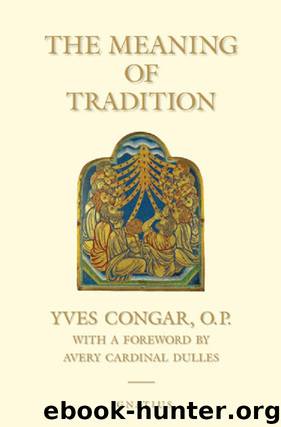The Meaning of Tradition by Yves Congar

Author:Yves Congar [Congar, Yves]
Language: eng
Format: epub
Tags: Spiritual & Religion
ISBN: 9781681497488
Publisher: Ignatius Press
Published: 2017-02-01T16:00:00+00:00
The respective qualities of Scripture and tradition
Both Scripture and tradition are human and divine, but in different degrees and conditions. It would be misleading to say that Scripture was wholly divine and tradition purely human: Scripture too is human and historical; biblical studies have increasingly revealed how its composition was conditioned by literary styles, imagery and even ideas. Nevertheless, in the holy Scriptures the human element is fixed once and for all, whereas in tradition it is present throughout the whole of this tradition’s historical duration. The holy Scriptures give us the word of the prophets and apostles in a human form, which, however, is the actual form given it by the prophets and apostles, while the form of the different monuments of tradition neither comes from the apostles nor is even of their period. And the form a thought takes is closely linked to the thought itself.
In both cases the divine aspect depends on the active role played by the Holy Spirit. The fact that the same Spirit operates in both is enough to ensure a certain continuity running through tradition and the Scriptures; we have seen that the Fathers, Schoolmen and Council of Trent have in fact proved the value of tradition in God’s economy for revealing himself and his plan by the action of the Holy Spirit. But theology has come to distinguish with increasing clarity the action of simple assistance from that of true inspiration.20 To think of these two as opposites, or simply to put too great a distance—amounting to a breach—between them, would be alien to the traditional line of the Fathers, the Schoolmen, Catholic ecclesiology and the Catholic Magisterium. And yet the difference is real and qualitative. It indicates two phases that correspond to what O. Cullmann calls, after St. Paul (1 Cor 3:10; Eph 2:20), the foundation, and the building, carried out through time upon these foundations laid once and for all.
Exactly the same value, therefore, should not be attributed to tradition and to the holy Scriptures, even if they are paid the same respect. The holy Scriptures have an absolute value that tradition has not, which is why, without being the absolute rule of every other norm, like the Protestant scriptural principle, they are the supreme guide to which any others there may be are subjected. If tradition or the Magisterium claimed to teach something contradicting the holy Scriptures, it would certainly be false, and the faithful ought to reject it.21 Scripture is always the supreme rule and is never submitted to any other objective rule. It is, however, not the sole principle regulating the belief and life of the Church. To this end God has established two other principles: tradition and the Church, with her pastoral Magisterium. The Protestant Reformation has unhappily put these three realities in opposition, subjecting one to the other and setting one against the other, whereas the whole genius of tradition consisted in uniting them and recognizing their mutual relations, so closely linked that one cannot be conceived divorced entirely from the two others.
Download
This site does not store any files on its server. We only index and link to content provided by other sites. Please contact the content providers to delete copyright contents if any and email us, we'll remove relevant links or contents immediately.
Periodization Training for Sports by Tudor Bompa(7328)
The MacArthur Bible Commentary by John MacArthur(4238)
The Body: A Guide for Occupants by Bill Bryson(3802)
The Sports Rules Book by Human Kinetics(3588)
What It Really Takes to Get Into Ivy League and Other Highly Selective Colleges by Hughes Chuck(3221)
Marijuana Grower's Handbook by Ed Rosenthal(3119)
The Sprouting Book by Ann Wigmore(3053)
Salt, Fat, Acid, Heat: Mastering the Elements of Good Cooking by Nosrat Samin(2658)
The Martian by Andy Weir(2611)
Classic by Mary Berry(2501)
The Bread Bible by Rose Levy Beranbaum(2472)
Harry Potter 4 - Harry Potter and The Goblet of Fire by J.K.Rowling(2416)
Sapiens and Homo Deus by Yuval Noah Harari(2415)
The Marketing Plan Handbook: Develop Big-Picture Marketing Plans for Pennies on the Dollar by Robert W. Bly(2414)
Martha Stewart's Baking Handbook by Martha Stewart(2332)
50 Economics Classics by Tom Butler-Bowdon(2066)
Screenplay: The Foundations of Screenwriting by Syd Field(2057)
The Cambridge Grammar Of The English Language by Rodney Huddleston Geoffrey K. Pullum(2048)
The Plant Paradox by Dr. Steven R. Gundry M.D(2040)
